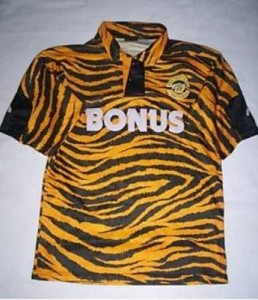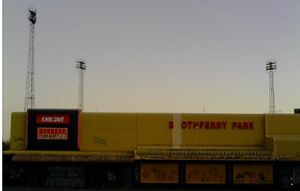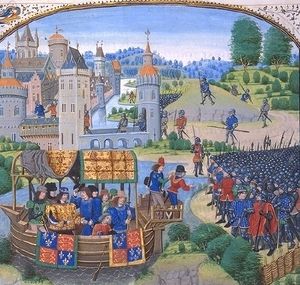Hull City AFC
“Err...No, Jeff, somebody's just been sent off, I don't know who 'cause I wasn't concentrating.”
– Dean Windass on Soccer Saturday
“This game is flatter than my missus' Yorkshire puddings!”
– Dean Windass on his wife's underendowment, or that of her cuisine
“To say Hull are the underdogs, is like saying Hitler was a bit naughty.”
– Warren Joyce on Hull City
Hull City Association Football Club (A.F.C.) is a football club based not in the hull of a sunken vessel but in Kingston upon Hull in Yorkshire, England. However, not unlike a sunken vessel, Hull City AFC is uniquely adept at plying formerly uncharted depths, such as those in the standings table. Brief flirtations with Championship have generally been cut short by the so-called "Curse of Hull City," invoked when anyone utters either of two phrases: "I've got a good feeling about today" or "Hey, we might actually win this!"
Overview[edit | edit source]
Hull City Association Football Club was founded in June 1904. Many previous attempts had failed, as the city was mainly dominated by Rugby League, or, "That game where they throw an inflatable egg 'round." They floated around promotion places of the second tier of English football until after the First World War, as 90% of the population decided that Belgium had a much better standard of living. Many soldiers remarked in disbelief, "They even have running water here!"
Due to these shortages of players, the Hull City Board re-signed some of the original first team. The F.A. were skeptical about this idea, as they thought wheelchairs could impact on the "Human element of the game."
World War II had a similar impact on the team, but this time, they had an ace up their sleeve: The new ground they had built, called Boothferry Park (or, as it was later known, Bothferry Park, on account of its decay and of one fan who thought that a gigantic O would look clever behind the bar in the parlour).
As the years progressed, the club drifted from mediocrity to poor to the verge of bankruptcy to the fans being told to bugger off because the electric bill wasn't paid. It was only when Adam Pearson took over the club that things started to turn around. His financial backing allowed Hull to start climbing the leagues until finally they reached the Holy Grail of all competitions, the Premier League. (Some might say the real Holy Grail would be a Championship Cup, but that remained out of reach.) In strikingly similar fashion to that of ten years ago, they went from good to mediocre to poor to the verge of bankruptcy to the verge of relegation, then to actual relegation. The club was in serious trouble until local businessman Assem Allam took over, saying, "I feel like I owe something to the city that gave me so much." Many fans, however, are still outraged by this, claiming that bloody foreigners can't play the game we know and love. Our sacred long ball is a key factor in beautiful football and we won't 'ave nobody taking that away from us!
The Early Days[edit | edit source]
Hull City AFC's first game was a friendly against Notts County. Six thousand people attended and the game ended in a 2-2 draw. Hull City led 2-0 at halftime, and the draw is often put down to "The Curse" — again, invoked by either of two fateful phrases: "I've got a good feeling about today" or "Hey, we might actually win this!" Both were uttered before this game. They later competed in 44 other friendlies before their first actual competitive game. Violence escalated to new heights, as new football hooligans spawned in and around the local area, disturbing many of the visiting fans, especially ones from teams in the south of England. One Chelsea fan was said to be in hysterics as he broke down in fear of catching Poor after touching one football hooligan. Hull City started to decline after the First World War and City continued to finish around the relegation places until, you guessed it, they got relegated. This trend would continue for the next 7 decades.
Claims to fame[edit | edit source]
Hull City have made a reputation of breaking boundaries and rewriting the rule book — the reputation being that they can do neither. One of their finest and most memorable hours was reaching the F.A. Cup Semifinal, showing that the sky is the limit (when the goal was a moon shot). Most memorable of all is that they were the first team in the history of the world to lose on penalties, once again showing that underachievement is an art that only a rare team can ever aspire to master. Hull City have an perfect record at Wembley, constituting 1 consecutive victory.
Hard-scrabble era[edit | edit source]
In the 1990s, little to no financial backing meant that Hull City were still fighting relegation, fighting administration, and simply fighting. Soon they were desperate for funds, as the Chairman left them with no buyer in sight. The life of this short and ultimately pointless football club looked to be nearing the end. But then Adam Pearson bought the club for a cool £1 and pumped literally dozens of pounds into the club. They continued to consistently finish in the mid table until the club relocated to the new KC stadium, capable of housing 25,400 people. This move (there can be no other explanation) instantly secured their promotion. The club did exceedingly well in League One and, with little to no support from anywhere else, achieved back-to-back promotion.
However, upon reaching the championship, they slumped into the old ways and began to struggle again. Because of this, Adam Pearson decided to sell up, stating, "I've taken this club as far as I can — and, to be honest, I can't be arsed any more." Their continual dwindling success resulted in fewer and fewer ticket sales, until the famous game against Watford where a record low of 12 Hull City fans, a confused and lost Slovakian tourist, and a duck called Colin with a basic understanding of the English language, made up the smallest attendance in Football League history.
Still, with an new chairman and new manager the next season, the club did spectacularly well in the league, securing the club's bright future as an underdog in a whole new league, the Coca-Cola Championship. Hull City were soon battling relegation. Another financial takeover let the club fight for promotion, and their chance came in the playoff final in 2008 — to which many fans reacted, "'Bout bloody time."
The Playoff final (Yes a final!)[edit | edit source]
The match was long and grueling — so long, in fact, that it is best to paraphrase the events that took place.
- Football
- Goal (see below)
- Halftime
- Football
- Unbearable tension
- Final whistle
- Piss-up (see below)
The Hull City fans and Bristol City fans still disagree about the single goal. The Hull fans swear that it was a 75-yard overhead kick, so powerful it knocked the pathetic goalkeeper unconscious. The Bristol City version is that it was actually a 2-yard tap-in that hit the cross bar and bounced out. They quickly kicked it up, but the referee gave the "goal" to Hull City. These Bristol fans demand to know the results of an eye test they claim was administered to the referee after the game.
Despite all the controversy, Hull won in the final and was promoted to the Premier League. In Hull it is common practice to celebrate with a ritual known as the "piss-up" in which the ancient ritual of getting "shit-faced" takes place and will normally end in the participant waking up in a pile of their own feces and/or vomit.
The Premier League[edit | edit source]
Hull City, after 104 years of hard work and toil, were finally in the top tier of English football. Unsurprisingly, they were again favorites for relegation in that first season. However the Everywhere-but-Hull Plague, often thought to have come directly from Hull, had a crippling effect on the other teams competing in the Premier League. Hull managed to beat such high-caliber teams as Tottenham and Arsenal. Arsenal's only goal came from the controversial signing of Colin the Duck, who indecently knew more English than the entire first team. By Christmas, they were in the top 5 joint top only third on goal difference (bloody goal difference!).
Unfortunately, over the Christmas break, someone uttered that dreaded phrase, "I've got a really good feeling about City!" The jinx was back on. Hull City went on to win only twice more, and only barely escaped relegation.
The next season saw Adam Pearson return as Hull City's Chairman. Phil Brown tried to make top quality signings but had to settle for Jimmy Bullard. They were soon struggling and failing to pick up any points. They also had to sell many of their players for financial reasons. In other words: I'd love to pay you money but I don't actually have any. Phil Brown also lost his job to Ian Dowie towards the end of the season (pretty much securing their fate as relegated) and finally the underdogs were back in the Championship.
The Fall[edit | edit source]
After the Tigers failed to sign Fred Dibnah on a free transfer, the mighty black and amber army fell into the abyss of League 1. With their inability to kick a ball, the chaps no longer gave two hoots and danced their merry way into the depths of League 1. It was believed that the Tigers had made a substantial deal to sign Jimmy Saville's ghost as a potential left-back, but deals went sour after he decided to play for Yorkshire rivals, Leeds United. Legend has it that even Rory the Tiger, the clubs beloved mascot, committed suicide upon their relegation, by drinking 9 litres of Harpic.



